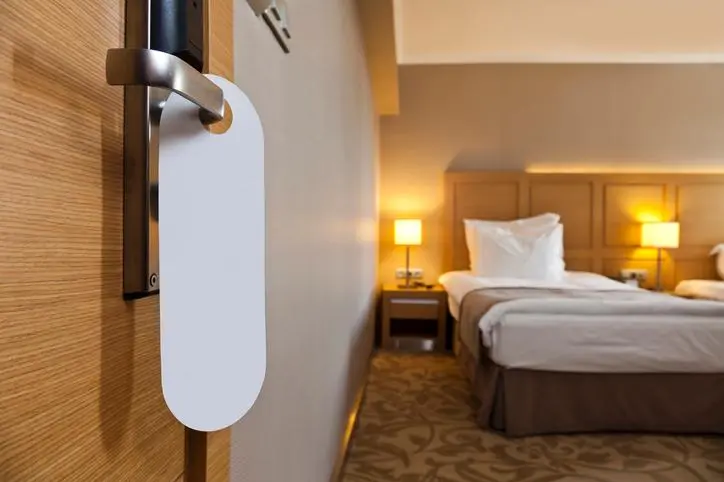PHOTO
Hotels that are reeling from dramatically low tourist traffic can get a much-needed boost by switching their focus to the so-called digital nomads, or people who work remotely from locations across the world, one of Dubai’s top executive has said.
The rise of teleworking has meant that a “new kind of tourism” has emerged, as more and more employers embrace the idea that work-from-homers can get things done from literally anywhere, not just at home, but at a café, on the beach, even overseas.
According to estimates, the community of digital nomads has grown since the onset of the pandemic. Among the American workers alone, the number of travelling professionals jumped by nearly half (49 percent) to 10.9 million this year, from 7.3 million in 2019, according to MBO Partners.
“This new kind of tourism presents an exciting opportunity for the hospitality sector to engage with a wider audience, one that is expected to grow in the post-pandemic world, as more people choose to do business outside of the traditional office environment,” Jose Silva, CEO of Jumeirah Group, told Zawya.
REMOTE WORK PACKAGE
The Dubai-based hotel operator has recently introduced its new “Discover Remote Work Package”, which entices work-from-homers from around the world to relocate to the emirate and stay in one of their properties, the Jumeirah Emirates Towers.
Guests can opt to stick around for a few days or weeks for a fixed monthly rate that can include free meals, beach access and even laundry services.
Dubai has recently unveiled its digital nomad visa scheme, which provides remote workers overseas the opportunity to move to the emirate with their families and stay for up to a year, with access to services like education, telecom and banking.
“The new programme gives you the freedom to come to Dubai, bring your family, and work remotely, all while remaining employed in your home country,” Visit Dubai said.
Silva said Dubai offers a safe space for remote workers who want to enjoy a unique work–life balance “with unrivalled leisure experiences”. There is also a “broader opportunity” for Dubai to attract and retain new talent, he said.
“With incredible weather, freedom of movement and strict adherence to protective measures, Dubai continues to have huge appeal both as a holiday destination and now as a place to discover the very best of remote working. It will also no doubt convince visitors that starting a new expat life in this amazing city could be the best decision they ever made,” Silva said.
“Many people will come to the city to work remotely, and while here, [they] will not only discover how vibrant and dynamic it is to work but that [the city] also offers a great lifestyle for both families and individuals,” he added.
The hospitality sector has been among the worst hit by the COVID-19 crisis, as international visitor traffic has plummeted since the onset of the health outbreak. Due to the slowdown, most hotels across the UAE are expected to end the year with less than 50 percent occupancy rates, according to Colliers International.
SHIFT FOCUS
For hoteliers to survive the pandemic, it is important to focus on the changing market trends.
“What’s key is that brands adapt to the needs of the market, which for many will be remote working or staying in a location longer to make the most of time away,” said Silva.
“At Jumeirah, we believe in agility. This is why we have launched our remote work package in Dubai to give digital nomads a safe space to do business and enjoy the city’s incredible lifestyle,” he added.
The feedback on their latest campaign so far has been positive, Silva noted, citing that “bookings have already been confirmed”.
Jumeirah’s remote work offer is for any customer looking for somewhere safe and dynamic to stay and work, as well as those who are looking for a better work–life balance.
“With idyllic temperatures until May and 365 sunny days a year, Dubai’s climate is ideal for all kinds of activities outside of working hours, and so our package is also for those who want to maintain or aspire to a better work–life balance,” Silva said.
“Our main focus, however, is on markets whose working hours would fit with those of Dubai for ease of doing business, such as Europe, Russia and CIS,” he said.
HOW MUCH IT COSTS
Remote workers who want to work from a luxury hotel should prepare to set aside a few thousand dollars per month.
At Jumeirah, the remote work package, which includes breakfast, laundry services for up to 20 items a week, twice weekly access to a two-kilometre private beach and entrance to temperature-controlled pool and facilities at Talise Fitness, can set one back €3,600 ($4,367) per head or €4,400 per couple, for a 31-day stay.
For a more “enhanced work experience”, guests can throw in an extra €500 ($606) a month per person to enjoy five business lunches every week throughout their stay, or for €1,250 a month per person for a full-board package that includes five business lunches and five dinners at select restaurants around Dubai every week.
(Reporting by Cleofe Maceda; editing by Seban Scaria)
Disclaimer: This article is provided for informational purposes only. The content does not provide tax, legal or investment advice or opinion regarding the suitability, value or profitability of any particular security, portfolio or investment strategy. Read our full disclaimer policy here.
© ZAWYA 2020





















